Victorio Hilario Guzmán (Victorio) was born in San Juan de las Nieves, a community in one of the poorest regions in Mexico: La Montaña, in the state of Guerrero. His story epitomizes that of thousands of people who migrate northwards to escape poverty, but only find loneliness and death.
Text: Vania Pigeonutt
Photos: Lenin Mosso, Ximena Natera and by courtesy of the Guzmán family
English interpretation and notes by Ann Deslandes
21 de diciembre del 2020
Malinaltepec, Guerrero
In the blue house that Victorio Hilario Guzmán built for his family, a white blanket with a black bow covers the left window. In black capital letters, the blanket reads:
«From La Montaña, Guerrero, Mexico;
justice is demanded for Victorio Victorio Guzman,
who died in the Bronx, N.Y. 23/09/2020«
Guzmán’s funeral was eight days ago. He made the entire journey back to his hometown in a coffin: he was run over on his electric bike on Wednesday, September 23rd at 7:47pm at the corner of the Grand Concourse and 180th Street, New York, only 10 minutes away from where he lived. He was en route to deliver a meal for the US takeaway food distribution giant DoorDash. Guzmán had not been in his hometown for 17 years.
Today in San Juan de las Nieves, the annual winter cold has begun. If you look out from the esplanade where the Guzmán home sits and a child plays in a plastic car, you can see mountains covered with mist, hills in different shades of green, corn crops, lilac and yellow flowers, wild gannets, lime trees. In the distance you can see opium poppy plants that will be in flower in January, when their gum will be ready for extraction.
It is Thursday 29th October. The smoke from the comal billows out of the wooden kitchen where three brown cats play as lunch is served: dried beef with mole montañero (a red broth that combines several chillies) as well as large tortillas and café de olla (coffee prepared in a clay pot). Victorio Guzmán’s family is gathered: his sister, Fabiola; his mother Zenaida; his father Felix Victorio; his cousin Lucero; his sister-in-law Rosa and his nephews. Later, his brothers Leonardo and Arnulfo will arrive. The space has become a refuge for mourning: in the end, 17 years is 6205 days without him.

Lucero, a bilingual intercultural educator, translates for Felix, 78, and Zenaida, 75, from their indigenous Mè pháá (Tlapaneco) language. Félix feels depressed, and Zenaida cries when she speaks. With the covid-19 pandemic the family is out of work, living on just enough for their daily bread. The elderly couple’s other three children who are in the United States—Elías, Celso and Ruben—cannot send them any money regularly either.
«It makes me very sad that my son went to work because we are poor and that his death was sudden. He was going to come and live with us in his house, this blue house he built. All that remains is for me to ask for justice and for the person responsible to be found, to explain to us why they ran away,» says white-haired Felix to his niece Lucero as she translates.
«When my son was little he would cut flowers to sell. With that money he would buy his huaraches [sandals]. His childhood was difficult because we used to wash the wool from the sheep, from which my husband would make gabanes [ponchos] to sell. Schooling was difficult. We couldn’t afford it with what we were working on, first we needed to dress them and have shoes for them”, says Zenaida.
“I had nine children, so Victorio decided to leave” [to find work to bring more income to the family].
Victorio’s sister Fabiola, a 36-year-old single mother with two children, is feeling her brother’s death. She managed the construction of his houses (as well as the blue house in Malinaltepec, Victorio also built one in Tlapa, the capital of La Montaña): with that she was able to send her children to school and pay her domestic expenses. With no other income, ‘Fabi’ holds an honorary position in the Malinaltepec local government through which she helps manage social programmes and maintain links between the village and the municipality.
«Being born here is very difficult, because there is no work here, there is nothing, money is scarce, that’s why so many migrate” she says. “Only by leaving here will they find something for their families”—something a little more than subsisting on growing corn, beans and pumpkin, or opium poppy [an especially risky crop].
«In the United States, a dog is worth more than a migrant,» continues Victorio Guzmán’s brother Arnulfo, who says he avoided the dangers of ‘going wet’ [migrating to the US]. Now, Arnulfo adds his voice to the demand for justice for Victorio’s death.
More relatives arrive in the kitchen, bringing candles to pray for Victorio’s repose. The family is dismayed and incredulous that his life does not appear to matter to the authorities.
Rage, impotence, sadness, despair: they say they feel everything at the same time. «We are the same blood, from the same god, yet we are discriminated against for being indigenous», concludes Fabi.
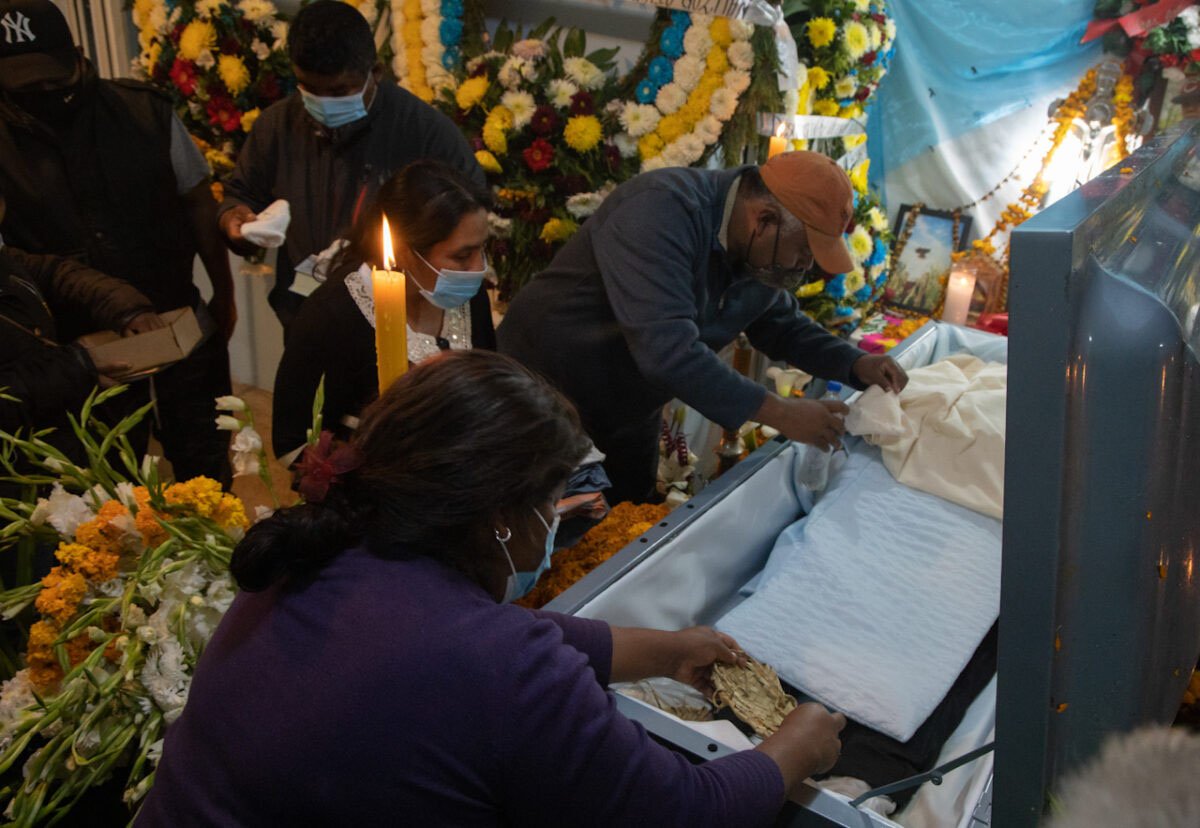
The Guerrero state government acknowledges that there are over a million guerrerenses[people from Guerrero] in the United States. Most of the two indigenous groups who come from La Montaña — Mè pháás or Tlapanecs, and Na’savi or Mixtecs — live in New York. They work in the service industry, in the fields and in construction; migrating from 19 municipalities across this indigenous zone of Guerrero, where 300,000 of the state’s 3.5 million inhabitants live. The pandemic did not stop such migration; indeed people continue to leave from throughout the seven regions of Guerrero.
Mexico’s foreign ministry reported that as of 4 December, they had coordinated the repatriation of 397 urns with cremated ashes from the United States, with support from airlines, federal and state governments, and the consular network.
As of 30 November, 2,968 Mexicans had died from covid-19 in the United States, and 18 in the rest of the world.
Mexico’s Foreign Ministry drew up a guide for transferring ashes or remains of nationals who die abroad. Victorio Guzmán’s family has not been helped by this scheme, nor did the Ministry pay for the transfer of his body.
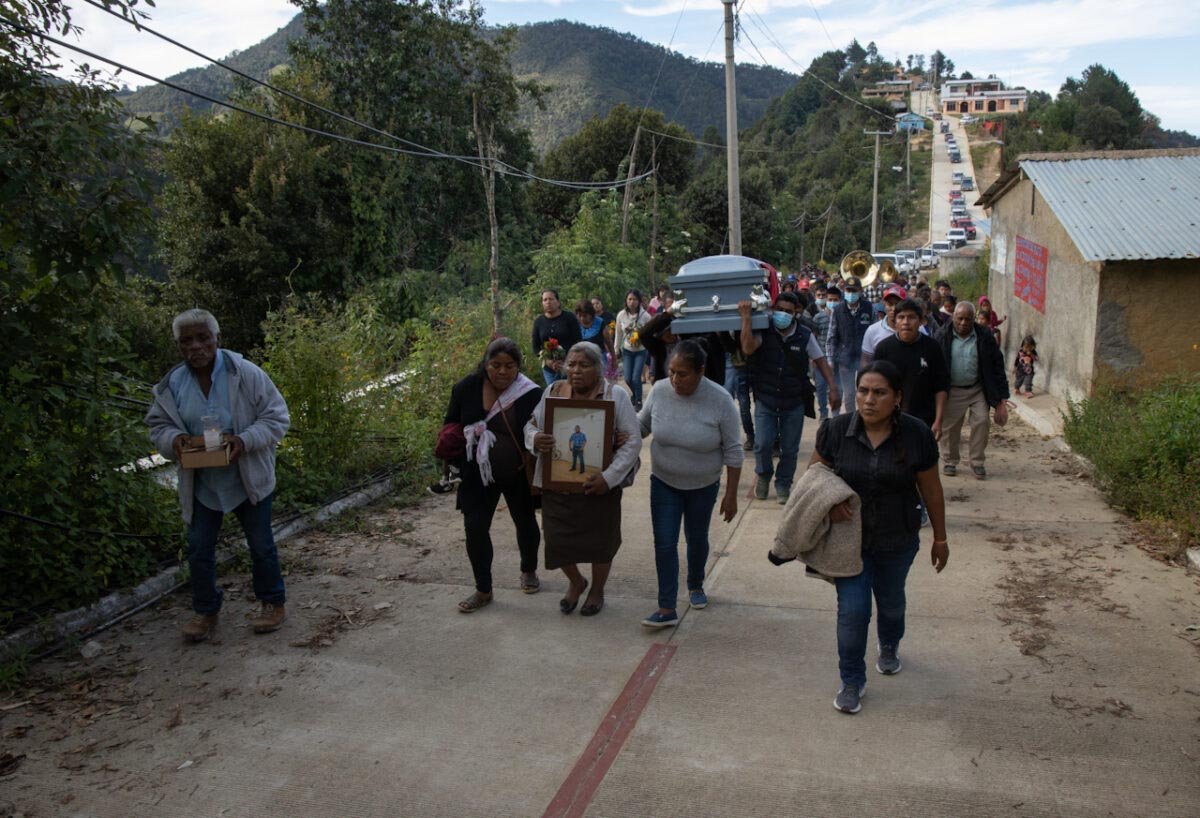
II. Resist
Elías Guzmán slept in the same room with his brother in a flat in Fordham Manor. Sometimes they ate and went for walks together. His life in the United States has been all work.
Never in his previous 18 years in the US had Elías participated in protests. This October he led one. With other migrants, he has demanded the dismissal of Jorge Islas López, Mexico’s general consul in New York, who, in all this time, has only sent the Guzmán family a letter of condolence, saying that the accident happened in Queens and not in the Bronx. Elías believes that it was just a generic letter, and says they have not had any legal support.
On 4 November Elías’s attention was called to another news item. Ernesto Isidoro Guzmán [no relation to the Guzmáns of La Montaña], another food delivery man, was hit on his bike in the Bronx as the driver ran away. He was a 43-year-old migrant from San Juan Epatlán, Puebla and the eighth delivery man of the year to be run over, after Victorio, the seventh.
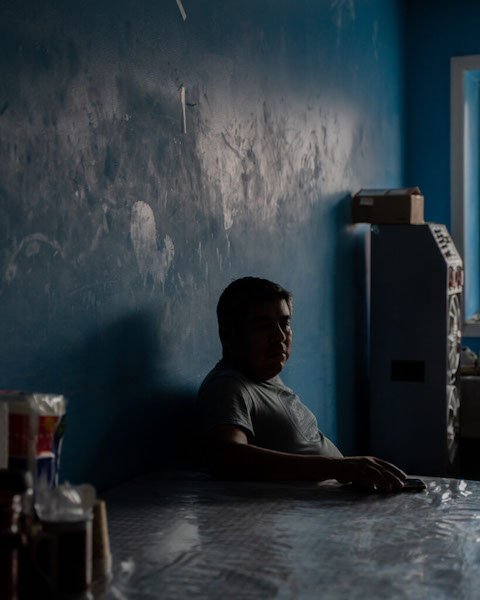
Elías, a kind man, is also 43. He stopped delivering with DoorDash in order to work on Victorio’s case, such as gathering the paperwork to receive $1,800 compensation that the Mexican Consulate in New York offered to pay the family.
Several vigils have been held on the Grand Concourse and 180th Street, where there is now a ‘ghost bike’ monument placed in Victorio’s memory. Neither Elías nor his brothers will return to Guerrero until they see the man responsible for Victorio’s death in jail.
During November and December Elías provided updates during several interviews by phone, WhatsApp video calls, and text messages. The consulate came up with the $1800 and sent flowers to the first vigil for Victorio, but neither has helped much.
For the funeral, the hospital and money transfers the family has spent about $15,000: their life savings. That is why Elías is disappointed with President Andrés Manuel López Obrador. Elías believed him when he said that in the United States there would be 50 consulates to help them,* to find them lawyers, to make their lives less complicated.
On 15 October they held the first vigil in the Bronx.
“Delivery workers. They are essential workers”.
Friends and family of Victorio Guzmán’s, Consul Jorge Lopez, New York State Senator Gustavo Rivera and activists arrived at the site. From San Juan de las Nieves alone, there were 30 countrymen, several of whom are Victorio’s cousins and nephews who live in New York. People arrived from other communities close to his in Malinaltepec, such as Moyotepec and La Ciénega, people who have also suffered the same tragedy without finding those responsible.
The protest was in three languages: Mè pháá, Spanish and English. «Nanda Xúri mambanú numuu Victorio Guzmán nangua iya xú…», reads a card demanding justice. “Justice!” is the most repeated demand.
There were mariachis on the pavement. All those present wore face masks. Taking the microphone, Elías reminded the audience that delivery workers are mostly migrants who risk their lives so that people do not have to go out, and can avoid getting infected with covid19.
Mirna Lazcano, a migrant rights activist and community organizer in East Harlem, said that companies do not give delivery workers minimum labor rights. They don’t even have the status of workers.
“DoorDash, UberEats, they marginalize delivery workers, discriminate against them; some people who order from these services steal from the workers, assault them; they report them to the companies, they expel them, the police confiscate their bicycles, the companies extort them by asking for $500 fees, to return their work equipment…”.
She continues: “It’s a disgrace to be treated with such classism. Migrants are chess pawns. When will it be time for inclusion, and for these people to have a life with dignity, Mr. Consul?”
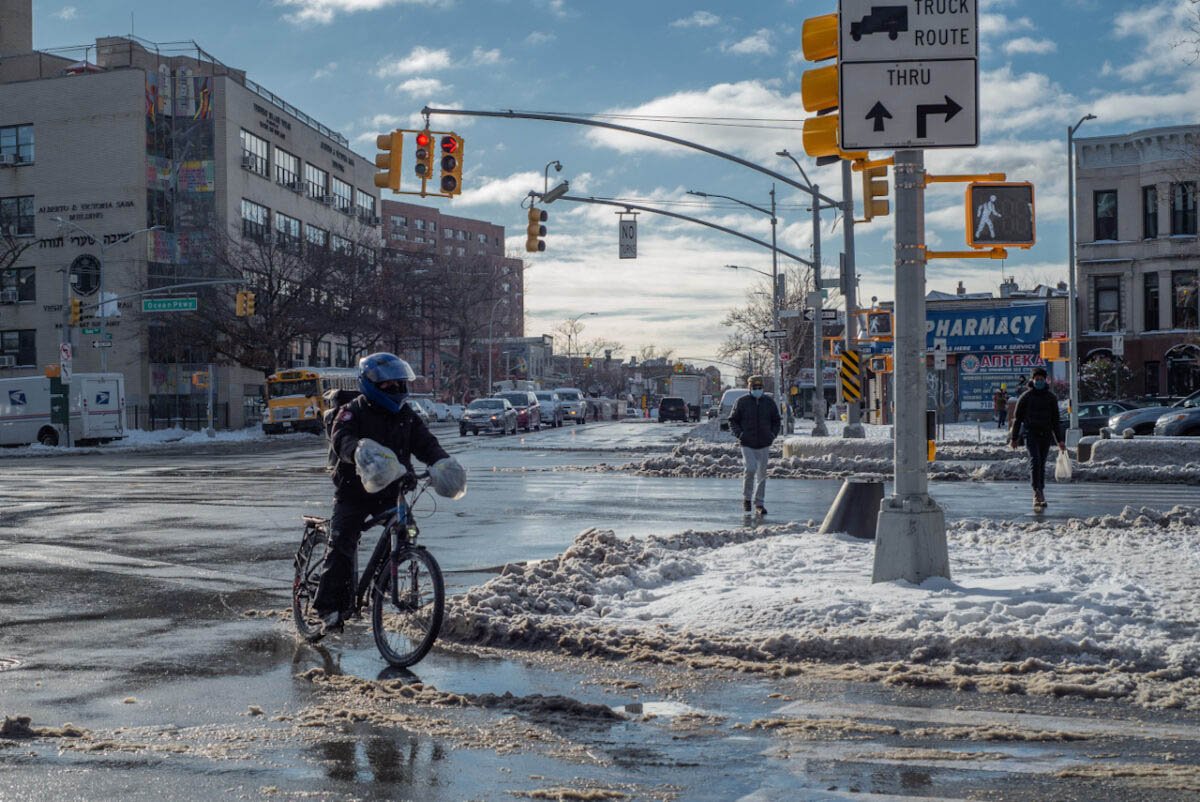
Consul Lopez said he was sad and angry. He pledged that this seventh accident would not go unpunished and that, with the team of lawyers from the consulate, he would demand fair compensation for Victorio from DoorDash.
Two months and five days have passed since that public promise before reporters and on Facebook Live broadcasts, and the consulate has not helped Victorio Guzmán’s family [to pursue the legal matters].
On October 24, Elías attended another memorial protest. Members of the streetmemorials.org project, Five Boro Bike Club and the Bronx Transportation Alternatives Committee installed the white bike in memory of Victorio, on the corner of the Grand Concourse and 180th Street in the Bronx. The majority of these bike installations, covered with flowers, that are placed by these activist groups, have been to mark the deaths of migrants on New York’s streets.
In late November, Danny Harris, the director of Transportation Alternatives stated that: “Two people were killed this weekend by preventable crashes on the streets of New York. To date, by 2020, at least 22 cyclists and 82 pedestrians have died. With more than 210 people killed in traffic violence so far, it is projected that 2020 will have the highest number of traffic deaths of any year during Mayor de Blasio’s term of office”.
New York is not able to provide safe streets for its cyclists: “only three percent of the city’s total miles of protected bicycle lanes are in the Bronx, compared to approximately 50 percent in Manhattan”, Transportation Alternatives claims.
* * *
Elías says that he and Victorio began working for DoorDash because they were out of formal work at the beginning of the year. Before this, Elías would arrange stock at the KingDeli, while his brother would work on the checkout. He keeps videos of their days at the deli, where Victorio worked for 14 years. Their brother Ruben kept his job in a restaurant kitchen.
- Are you paid well at DoorDash? How are you hired? asked Pie de Página.
- We don’t have a contract; you fill out an application online, you are accepted to work and they send you the bag to deliver the food and a card to pay for the food in a restaurant. The basic payment is 3 dollars each order, plus sometimes they put 2 dollars as a bonus. You can earn five. If the customer puts in at least one dollar, two dollars per tip, it is already seven dollars, eight dollars, up to 10 dollars per order.
- How many orders could they place in one day?
- As many people didn’t want to work because of the pandemic, they threw orders at you fast: you do about 15, 20 orders a day, you make about 100 dollars a day. Depending on how keen you are, if you deliver faster, you make money faster.
But 100 dollars a day is not enough when just renting a flat of no more than 80 square meters that costs 2,500 a month. They divided the rent between four: Victorio and Ruben, his brothers, Martin, a neighbour from the mountains, and himself. They all have to send money to their family.
 9.02.32 a.m. copia.png)
Being a migrant in the United States is not easy. The first thing the brothers did was to walk for hours and hours in the desert, drink dirty water, evade the police, run and suffer. The first was Arnulfo in 2000, when he witnessed the fall of the Twin Towers on September 11, 2001. A year later, his older brother, Eutiquio, who is a teacher, lent Elías $900 to leave. The coyote [people smuggler] charged him 1,500 in total.
Their father borrowed 4,000 pesos and with that Elías went from Guerrero to Mexico City; to Hermosillo, Sonora; by car to Altar, Sonora and from there he walked for many hours, then paid 300 pesos to be taken to the border fence. At 8pm they jumped the fence, continued for about 20 minutes running, then walking normally. There were 27 people in the group taken by their coyote, seven of them women.
Elías’s journey to New York took seven days. He had never been so thirsty. He arrived in February 2002. With the help of other migrants he found a job for 250 dollars every six days, then another job in a pizzeria for 300 dollars a week. He sent 600 dollars to his brother Celso who arrived in August of that year. Victorio, with the help of both of them, made the same journey in February 2003: first he worked in a billiard hall until he and Elías went to the King Deli. In 2005 Elías returned to see his children in San Juan for five years.
DoorDash has not acknowledged anything. They sent Elías a letter of condolence, but he must get a labor lawyer to demand fair compensation. The San Francisco-based company reported revenues of nearly $2 billion through September [2020], twice as much profit as in 2019.
Activist Joel Magallanes, director of the Tepeyac Association of Nueva York, an organisation that watches over the rights of indigenous migrants laments above all that the city was closed for covid-19 and there was no help for undocumented migrants.
Another problem, which the Guzmán brothers and their family in New York have also protested about, is the payment of rent. Magellan says that some [migrants] were thrown out of their rental accommodation without being allowed to pay later—people were left without work, it is not that they did not want to pay. Moreover, in New York more than 500 migrants died from covid-19.
Lawyer Juan José Gutiérrez, director of the Coalition for Full Rights for Migrants, says that conditions for migrants in their sectors of work have continued to deteriorate this year. He recalls that more than 2,000 Latino immigrants were killed in the September 11 attacks on the Pentagon, 200 of whom were Mexicans who had no compensation.
In the meat industry alone, processing plants are operated with immigrant workers. It is estimated that there are more than 600 thousand employed in this sector who are considered essential workers without having their [labour] rights recognised, much less when they die or suffer from accidents. Likewise with those working elsewhere on the front lines of the pandemic in a country of more than 300.000 dead. And the US has not stopped the arrests and deportations of the undocumented.
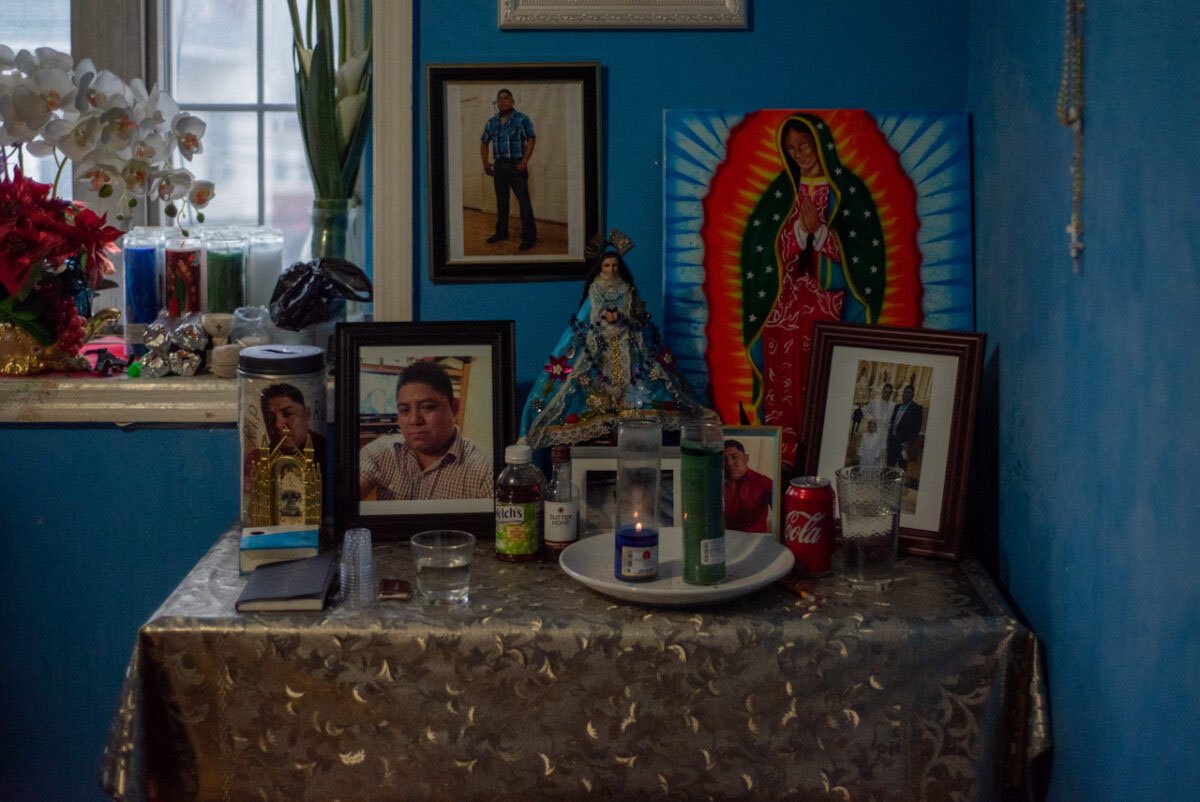
III. Dying
At 4pm on September 26th, 37-year-old Victorio died in a bed at St. Barnabas Hospital, located in the Bronx district of New York.
Three days earlier he had eaten chicken broth and tortillas with his brother Elías at the flat in Fordham Manor. He planned to eat golden chicken tacos with broth when he returned from delivering his order. He left his home at 7:03pm, shortly after seeing the order notice. He was happy because he had changed his bicycle tyres.
Shortly after 10 p.m. on 23 September, New York police inspectors arrived to advise the family of the accident. Elías was about to eat the tacos, he opened the door. He immediately went to the hospital with his brother Rubén, who thought that Victorio had only been injured.
Upon arriving at the hospital they were told their brother was brain dead. The driver of a black Honda Concord car, which they later found in Michigan, had stripped him of his clothes. Elías, Celso and Ruben wanted their parents to receive a humanitarian visa so that they could come to see Victorio off in New York, as indigenous people the strongest traditions are around death. If you don’t say goodbye to the deceased, their soul remains in pain.
- I talked to him and he cried. I tried to open his eyes, but his eyes were already unconscious. Two drops of tears came to his eyes. I told him not to go: sorry, you’re going to get well, I’m going to be with you. I spoke to him about everything I felt, just as we had always been.
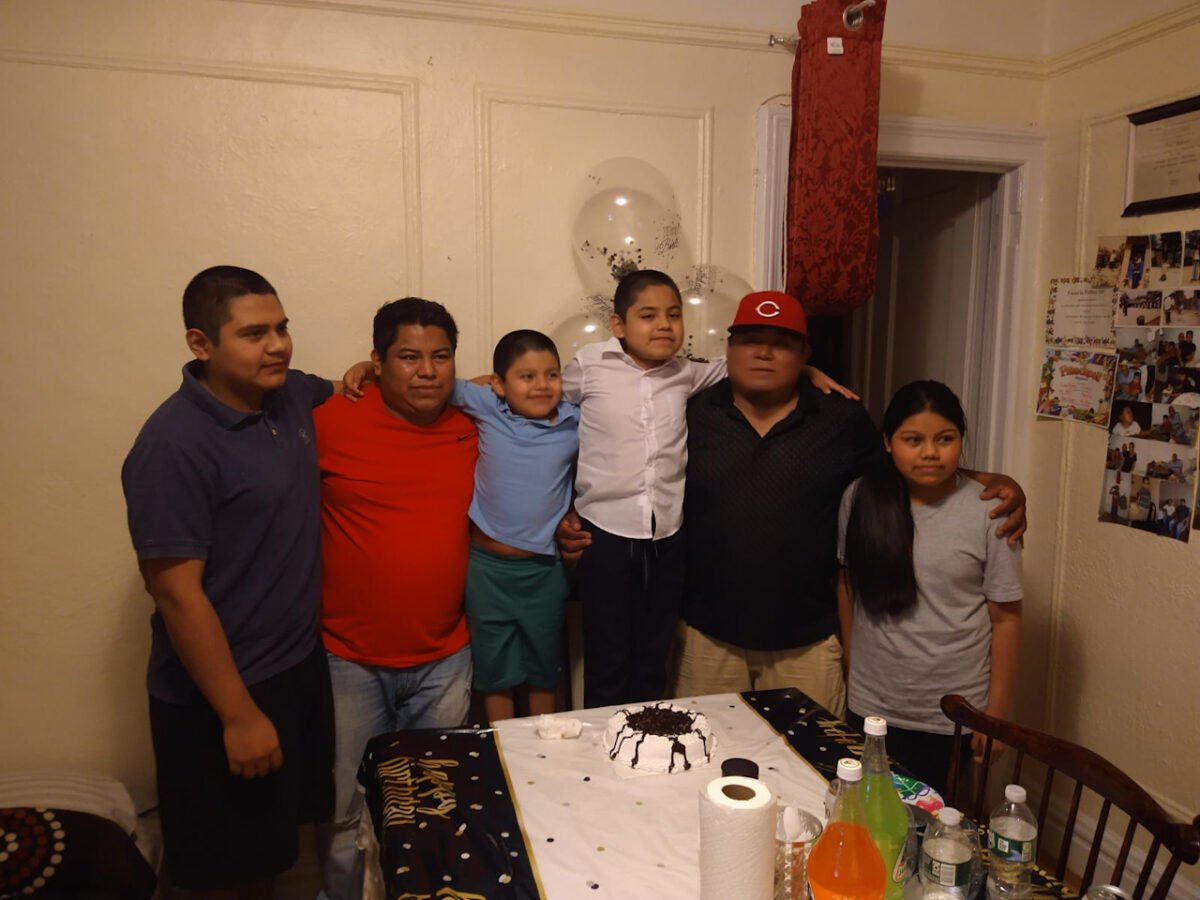
Elías kept Victorio’s clothes and more than 10 thousand photos and videos that he could recover from his brother’s online cloud. Victorio loved football, there were photos of his last birthday on July 4th, the US independence day, you can see the brothers Celso and Ruben slicing a cake together with cousins and family. They smile.
Abel Barrera Hernández, director of La Montaña’s Tlachinollan Centre for Human Rights believes that the covid-19 pandemic has demonstrated even more [the phenomenon of] what he calls ‘Tlapayork’—the number of people from Tlapa, the central municipality of La Montaña in Guerrero who go to New York. There is a whole community living in New York [and the US] and a consular and structural neglect of the causes of migration, at the same time.
The people of Guerrero are going to die in the United States. The poverty in the mountains does not leave many options.
Until 2017, the price of a kilo of opium gum was around 15,000 pesos in the region, and as the cost dropped, it became unprofitable for people to invest money and a season’s work in an illicit crop. This year [as the price of the opium poppy rose again due to pandemic market forces], people resumed planting in several municipalities of La Montaña. There was also an increase in internal migration: a historic high of more than 14,000 agricultural day labourers leaving the region to work on farms further north.
Poppy cultivation is not easy. Even though they just do the agricultural work and not the cooking of the heroin made from opium poppy gum, still soldiers could exterminate their crop or put them in prison, so people prefer to go as day labourers to the northern states to pick tomatoes and chillies, or to cross the US border.
«Poppies were part of the community economy, but it is not a safe market», said Barrera.
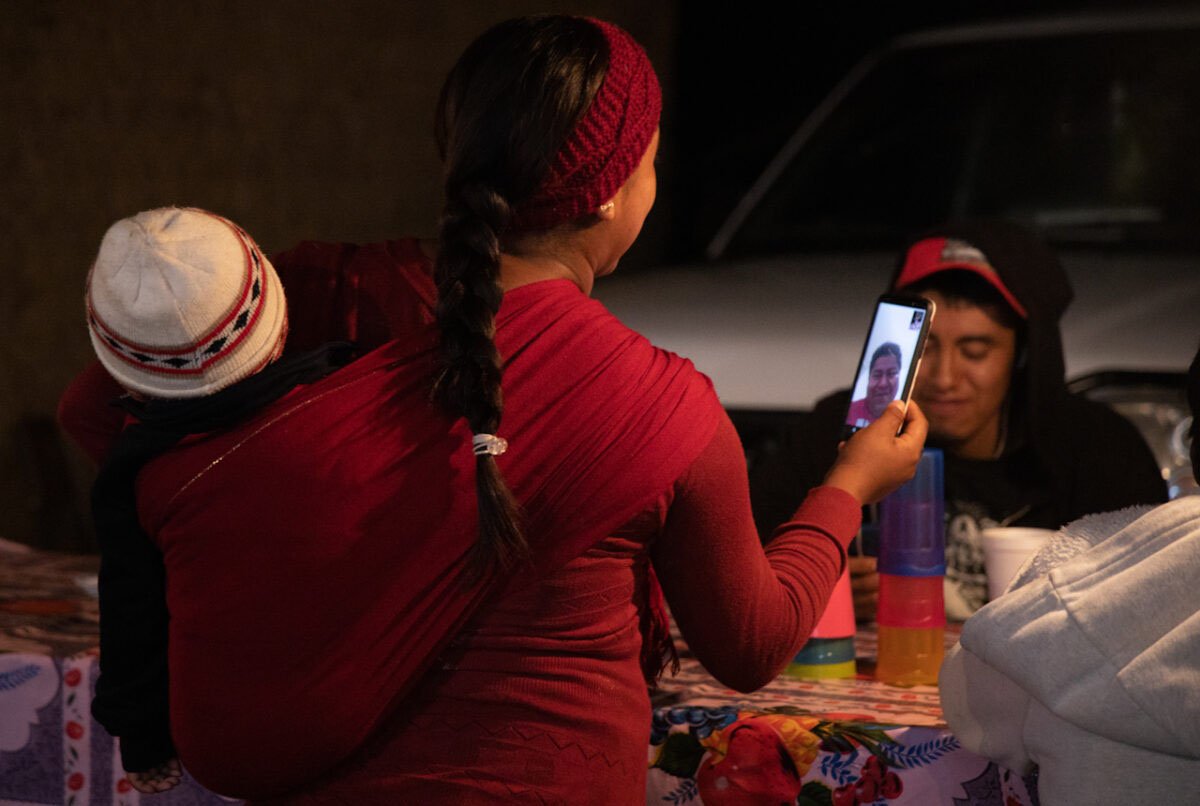
Victorio Hilario Guzmán’s family told stories around the poppy. They say it has been the only option for many families who have been stigmatized, killed, disappeared and imprisoned. Elías remembers that they started to dream of earning dollars, as such, to avoid dying or planting poppies. «There are families where their children start [their working lives growing and harvesting poppy] as if it were a cornfield. It is the only option because there is no [other] work».
In a briefing provided to Pie de Página, the Mexican Foreign Ministry said that it has referred the family to the Office of Victims of Crime and assisted them to receive benefits as soon as possible. Elías says that this is not true, nor is it true that the New York Prosecutor’s Office took care of the funeral expenses, which the Foreign Ministry also states in the document.
«The case was referred to consulting attorney Andrew Carboy, who is exploring the possibility of filing a civil suit against the employer. However, the lawyer does not consider the case to have much chance», the briefing from the Ministry says.
Elías Guzmán dismisses the words from the Ministry, saying he and his family are alone.
Activists helped him to create a petition to help [with their costs]. So far they have collected over a thousand dollars. https://es.gofundme.com/f/7ec99-repatriacion
The afternoon was cold in both Guerrero and New York when Fabiola, Rosa, Felix, Zenaida, Arnulfo and several of their nephews and nieces witnessed their brother’s disconnection via WhatsApp.
Victorio is the second brother to die, the first was named Octavio, who was shot several times in his village in circumstances that have never been clarified.
*e.g. ‘Consulados en EU defenderán a paisanos migrantes, dice AMLO’, Televisa 12 Marzo 2019 https://noticieros.televisa.com/ultimas-noticias/amlo-consulados-mexico-estados-unidos-defenderan-paisanos-migrantes/
English interpretation and notes by Ann Deslandes



